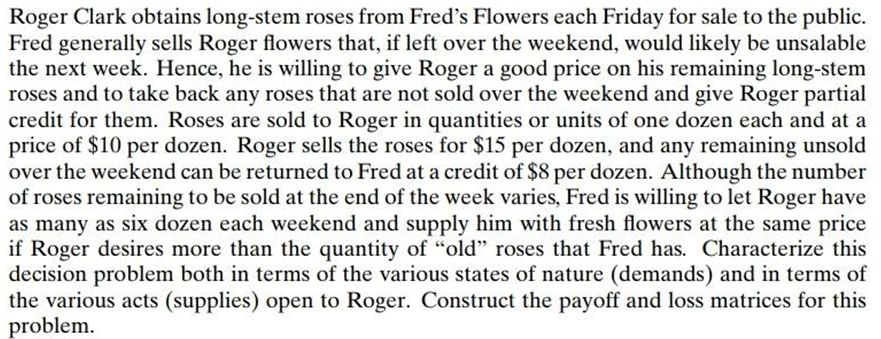Roger Clark obtains long-stem roses from Fred's Flowers each Friday for sale to the public. Fred generally sells Roger flowers that, if left over the weekend, would likely be unsalable the next week. Hence, he is willing to give Roger a good price on his remaining long-stem roses and to take back any roses that are not sold over the weekend and give Roger partial credit for them. Roses are sold to Roger in quantities or units of one dozen each and at a price of $10 per dozen. Roger sells the roses for $15 per dozen, and any remaining unsold over the weekend can be returned to Fred at a credit of $8 per dozen. Although the number of roses remaining to be sold at the end of the week varies, Fred is willing to let Roger have as many as six dozen each weekend and supply him with fresh flowers at the same price if Roger desires more than the quantity of "old" roses that Fred has. Characterize this decision problem both in terms of the various states of nature (demands) and in terms of the various acts (supplies) open to Roger. Construct the payoff and loss matrices for this problem.
Roger Clark obtains long-stem roses from Fred's Flowers each Friday for sale to the public. Fred generally sells Roger flowers that, if left over the weekend, would likely be unsalable the next week. Hence, he is willing to give Roger a good price on his remaining long-stem roses and to take back any roses that are not sold over the weekend and give Roger partial credit for them. Roses are sold to Roger in quantities or units of one dozen each and at a price of $10 per dozen. Roger sells the roses for $15 per dozen, and any remaining unsold over the weekend can be returned to Fred at a credit of $8 per dozen. Although the number of roses remaining to be sold at the end of the week varies, Fred is willing to let Roger have as many as six dozen each weekend and supply him with fresh flowers at the same price if Roger desires more than the quantity of "old" roses that Fred has. Characterize this decision problem both in terms of the various states of nature (demands) and in terms of the various acts (supplies) open to Roger. Construct the payoff and loss matrices for this problem.
Managerial Economics: A Problem Solving Approach
5th Edition
ISBN:9781337106665
Author:Luke M. Froeb, Brian T. McCann, Michael R. Ward, Mike Shor
Publisher:Luke M. Froeb, Brian T. McCann, Michael R. Ward, Mike Shor
Chapter16: Bargaining
Section: Chapter Questions
Problem 16.6IP
Related questions
Question
R3

Transcribed Image Text:Roger Clark obtains long-stem roses from Fred's Flowers each Friday for sale to the public.
Fred generally sells Roger flowers that, if left over the weekend, would likely be unsalable
the next week. Hence, he is willing to give Roger a good price on his remaining long-stem
roses and to take back any roses that are not sold over the weekend and give Roger partial
credit for them. Roses are sold to Roger in quantities or units of one dozen each and at a
price of $10 per dozen. Roger sells the roses for $15 per dozen, and any remaining unsold
over the weekend can be returned to Fred at a credit of $8 per dozen. Although the number
of roses remaining to be sold at the end of the week varies, Fred is willing to let Roger have
as many as six dozen each weekend and supply him with fresh flowers at the same price
if Roger desires more than the quantity of "old" roses that Fred has. Characterize this
decision problem both in terms of the various states of nature (demands) and in terms of
the various acts (supplies) open to Roger. Construct the payoff and loss matrices for this
problem.
Expert Solution
This question has been solved!
Explore an expertly crafted, step-by-step solution for a thorough understanding of key concepts.
Step by step
Solved in 2 steps with 1 images

Knowledge Booster
Learn more about
Need a deep-dive on the concept behind this application? Look no further. Learn more about this topic, economics and related others by exploring similar questions and additional content below.Recommended textbooks for you

Managerial Economics: A Problem Solving Approach
Economics
ISBN:
9781337106665
Author:
Luke M. Froeb, Brian T. McCann, Michael R. Ward, Mike Shor
Publisher:
Cengage Learning

Managerial Economics: A Problem Solving Approach
Economics
ISBN:
9781337106665
Author:
Luke M. Froeb, Brian T. McCann, Michael R. Ward, Mike Shor
Publisher:
Cengage Learning